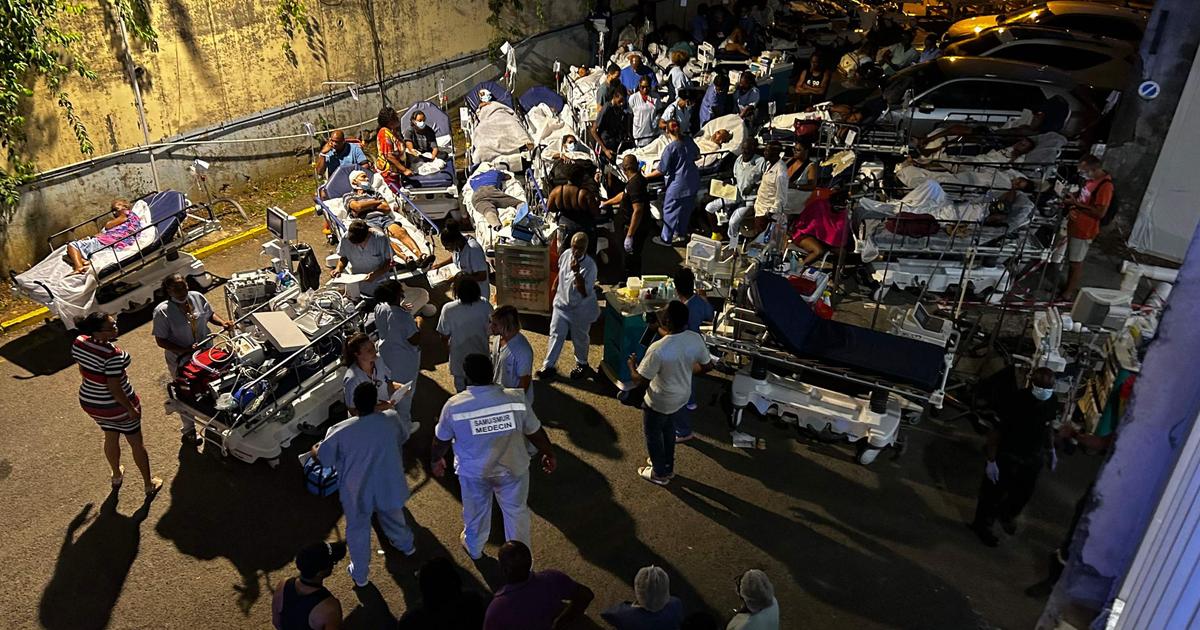The controversy has been running since the spring, but in recent days it has come back to the fore.
Are resuscitation services undersized in France in the face of the new coronavirus?
Can the hospital treat an outbreak of heavy Covid-19 infections without deprogramming other interventions?
Sunday evening, Olivier Véran did not hide his annoyance and published a series of five messages on Twitter in the form of an update.
Faced with repeated attacks from the opposition and from part of the medical profession, who accuse the government of not having permanently increased the quantity of available beds, the Minister of Health has taken issue with it.
“From 5,000 resuscitation beds, we could go up to 12,000 if the health situation required it”, promised the Minister of Solidarity and Health.
For a few days now, I have been reading and hearing that if France had more resuscitation beds, we would not be obliged to take measures, sometimes harsh for our social and economic life.
I would like to say why this reasoning offends me.
- Olivier Véran (@olivierveran) October 11, 2020
Despite the still opaque reporting of data on the subject, we tried to take stock of this issue.
And on the risk of saturation.
How many people are there in intensive care today?
It is impossible to obtain this figure in real time, all diseases combined.
Neither in absolute value nor in percentage.
Just do we know that during the first wave, at the height of the hospital crisis (around April 8), there were about a total of "8,200 patients in intensive care for 10,500 operational beds", according to figures from the Ministry of health.
READ ALSO>
Hospitals facing Covid-19: the noose is tightening
Only statistics related to Covid-19 are updated daily and accessible online.
As of Monday evening, there were more than 1,539 serious cases taken care of, a milestone already crossed on March 20 (but the trend was then exponential).
And this for a capacity of “5,800 solid resuscitation beds”, indicates to the Parisian the Ministry of Solidarity and Health.
That is to say beds ordered and equipped exclusively for resuscitation, not existing beds that one decides to convert.
Before the crisis, that number was around 5,000.
A little less than 30% of beds are therefore occupied in France because of the Covid-19.
However, the analysis of this national rate does not really make sense as the disparities are strong from one region to another.
In some areas, such as Marseille or Hauts-de-France, patients with Covid-19 occupy more than a third of the beds.
In Île-de-France, they represented nearly 42% of cases on Monday, according to the ARS.
Why this estimate of 12,000 intensive care beds?
We must be interested in a ministerial note dated July 17, 2020 to understand the main lines of the battle plan "in the event of a new wave".
This document (available here) proposes several hypotheses, the most pessimistic of which corresponds to this famous bar of 12,000 intensive care beds.
READ ALSO>
Our articles on the coronavirus
Newsletter - Most of the news
Every morning, the news seen by Le Parisien
I'm registering
Your email address is collected by Le Parisien to enable you to receive our news and commercial offers.
Learn more
This estimate is based on a survey of regional health agencies.
Their feedback from the first wave enabled them to assess how many additional places they were able to create.
In short: about two to three times more.
In the Ile-de-France region, we went from 1147 (2018 figures) to 2700 on May 22, 2020. In Corsica, the number is multiplied by four (18 to 72).
Concretely, we achieve this by transforming rooms.
Nearly 80% of the beds created in emergencies in the spring came from the fitting out of so-called “intensive care” rooms, recovery rooms and operating theaters.
We must of course add human reinforcements to this.
Such a site "requires a large number of additional staff who will not be present directly and cannot be available throughout the national territory at the same time", the authorities themselves warned in this note.
According to them, up to 24,000 nurses and 10,500 additional nursing assistants will have to be recruited in the event of a black scenario.
Why does this goal seem difficult to achieve?
Going up to 12,000 beds involves many concessions, even sacrifices.
The first of them is to cancel again a good number of emergency interventions, especially in oncology.
This is called "deprogramming".
“It seems foolish to me to get back into a near-war situation.
There are too many patients who need to be operated, there is already a lot of delay and everything has not yet been compensated ”, breathes Christian-Michel Arnaud, anesthetist-resuscitator in a private clinic in Bayonne (Pyrénées- Atlantiques) and Honorary President of the National Union of Anesthesiologists.
His counterpart Laurent Heyer abounds.
"I would like to know the magic formula of Olivier Véran, launches the secretary general of the National Professional Council Anesthesia-Resuscitation.
A solution should also be found to train in one week twice the number of competent caregivers at present.
It takes about one nurse for two Covid-19 patients.
For a nurse, with a State diploma, this requires at least 6 months of integration.
"Very critical of the government, he deplores the" calamitous "management of bonuses and allowances granted to caregivers who came to the rescue.
"Most are disgusted and will not come back."
READ ALSO>
"I couldn't do it anymore ..." These caregivers preferred to say stop
The Ministry of Solidarity and Health wants to believe it in an express mobilization, thanks to the trainings carried out during the first wave and to the summer negotiations.
"The Ségur de la Santé has been a necessary job but is not a balance of any account," the ministry said.
The caregivers are exhausted, we all know it, but we hope and we know that they will be there to treat the patients ”.
Regarding the choice to remain flexible in terms of the number of beds, the ministry invokes "a principle of reality".
For him, it is firstly impossible to push the walls ”, and secondly, inconsistent to build beds upstream without knowing“ where the virus will strike ”.
Are resuscitation beds the alpha and omega in the fight against Covid-10?
Obviously, no.
Like Olivier Véran's tweets this Sunday, the government does not want the fight against Covid-19 to focus on resuscitation beds.
"This is not the crux of the problem", insists in those around Olivier Véran.
Compliance with movement restrictions and barrier gestures remains the priority.
This, according to the authorities, is the key to avoiding saturating resuscitation services and increasing deaths.
"It's common sense," admits practitioner Laurent Heyer, like Christian Michel-Arnaud.
However, their observation is just as severe when we talk to them about the screening, "tracing" and isolation strategies deployed by the government.
“This summer, we brought the infected people home instead of isolating them.
Now it's too late.
With 15,000 cases per day, what do you want to do?
Asks Christian-Michel Arnaud.
He already fears the aftermath and "just hope that we will confine in an intelligent way."
PODCAST. "We are not being prepared for this! ": Léa, 26, medical intern, facing the coronavirus













